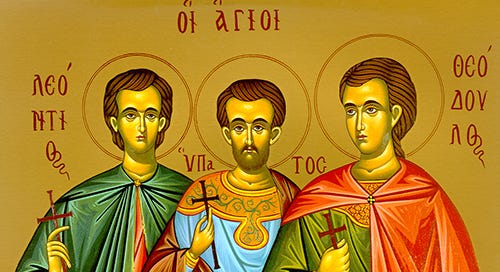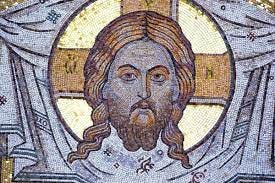“Every day we should stand in awe of Him, as He is with us, and do what is pleasing before Him. If we are unable now to perceive Him with our physical eyes, we can, if we are watchful, see Him continuously with the eyes of our understanding and not just see Him, but reap great benefits from Him.”
St. Gregory Palamas
Romans 4:13-25
Brethren, the promise to Abraham and his descendants, that they should inherit the world, did not come through the law but through the righteousness of faith. If it is the adherents of the law who are to be the heirs, faith is null and the promise is void. For the law brings wrath, but where there is no law there is no transgression. That is why it depends on faith, in order that the promise may rest on grace and be guaranteed to all his descendants — not only to the adherents of the law but also to those who share the faith of Abraham, for he is the father of us all, as it is written, “I have made you the father of many nations” — in the presence of the God in whom he believed, who gives life to the dead and calls into existence the things that do not exist. In hope he believed against hope, that he should become the father of many nations; as he had been told, “So shall your descendants be.” He did not weaken in faith when he considered his own body, which was as good as dead because he was about a hundred years old, or when he considered the barrenness of Sarah’s womb. No distrust made him waver concerning the promise of God, but he grew strong in his faith as he gave glory to God, fully convinced that God was able to do what he had promised. That is why his faith was “reckoned to him as righteousness.” But the words, “it was reckoned to him,” were written not for his sake alone, but for ours also. It will be reckoned to us who believe in him that raised from the dead Jesus our Lord, who was put to death for our trespasses and raised for our justification.
Matthew 7:21-23
The Lord said, “Not everyone who says to me, ‘Lord, Lord,’ shall enter the kingdom of heaven, but he who does the will of my Father who is in heaven. On that day many will say to me, ‘Lord, Lord, did we not prophesy in your name, and cast out demons in your name, and do many mighty works in your name?’ And then will I declare to them, ‘I never knew you; depart from me, you evildoers.’
Martyrs Leontius, Hypatius, and Theodulus at Tripoli in Syria
The Holy Martyrs Leontius, Hypatius, and Theodulus were Roman soldiers. The holy Martyr Leontius, a Greek by origin, served as a military-chief in the imperial army in the Phoenician city of Tripoli during the reign of Vespasian (70-79). Leontius was distinguished for his bravery and good sense, and the people of Tripoli held him in deep respect because of his virtue.
The emperor appointed the Roman senator Adrian as governor of the Phoenician district, with full powers to hunt out Christians, and in case of their refusal to offer sacrifice to the Roman gods, to give them over to torture and death. And on his way to Phoenicia Adrian received a report that Saint Leontius had turned many away from worshipping the pagan gods. The governor sent the tribune Hypatius with a detachment of soldiers to Tripoli so as to find and arrest the Christian Leontius. Along the way the tribune Hypatius fell seriously ill, and being near death, he saw in a dream an angel, which said: “If you wish to be healed, you and your soldiers should say three times: ‘God of Leontius, help me.’”
Opening his eyes Hypatius beheld the angel and said: “I was sent to arrest Leontius, how is it that I should appeal to his God?” At this moment the angel became invisible. Hypatius told his dream to the soldiers, among whom was his friend Theodulus, and all of them together asked for help from the God Whom Saint Leontius confessed. Hypatius was immediately healed to the great joy of his soldiers, but only Theodulus sat aside, pondering the miracle. His soul was filled with love for God, and he told Hypatius to proceed twice as quickly to the city in search of Saint Leontius.
Upon their arrival in the city, a stranger met them and invited them to his house, where he lavishly hosted the travellers. Learning that their hospitable host was Saint Leontius, they fell on their knees and asked him to enlighten them with faith in the True God. They were baptized here, and when Saint Leontius prayed over them calling on the Name of the Most Holy Trinity, a luminous cloud overshadowed the newly-baptized and poured forth rain. The remaining soldiers in search of their commander arrived in Tripoli, where the governor Adrian had also arrived. Learning what had happened, he ordered Saints Leontius, Hypatius, and Theodulus to be brought to him. After threatening them with torture and death, he demanded that they renounce Christ and offer sacrifice to the Roman gods.
All the martyrs firmly confessed their faith in Christ. Saint Hypatius was put under a column and raked with iron claws, and Saint Theodulus was mercilessly beaten with rods. Seeing the steadfastness of the saints, they beheaded them. And after torture, they sent Saint Leontius to prison. In the morning he came before the governor. Adrian tried to entice the holy martyr with honors and rewards, and accomplishing nothing, he gave him over to new tortures. The holy martyr was suspended head downwards from a pillar with a heavy stone about his neck, but nothing could make him renounce Christ. The governor gave orders to beat the sufferer with rods until he died. They then threw the body of the holy Martyr Leontius outside the city, but Christians reverently gave it burial near Tripoli. The death of the holy martyrs occurred between 70-79.
The accusation against Saint Leontius, and his sufferings and death are recorded on tin tablets prepared by the court scribe [commentarisius]. These tablets were placed at the grave of the holy martyr.
Time
Fr. Dumitru Stăniloae
For God, time is the waiting period between when he ‘knocks at the door’ and we open it wide for him (‘If someone hears my voice and opens the door, I will enter and dine with them and they with me’ (Rev. 3, 20).
In this sense, time also denotes our freedom and the respect which God has for his creatures. God doesn’t enter our heart through violence. Union with him in love can be achieved only through our free acceptance of the offer of it. This is why God gives us time. And because of the respect God has for those whom he fashioned, he experiences time just as we do. Because there can be no doubt that when we don’t hear God’s voice or when we choose not to answer it we’re simply ‘on hold’- we fall into a state of waiting on various things and, in the end, live a life entirely immersed in time.
When what we’re expecting is of great personal importance for us, we understand better the passage of time. And this expectancy of some significant event always includes a feeling of joy, which takes hold in the soul and dispels sorrow. The most intense expectation or anticipation, everyone’s greatest desire, is that of unreserved love from someone else.
Time is like the distance between the two ends of a bridge. There’s something uncertain, something unclear about it. It concerns a state of movement either towards death or towards the fulness of life.
Time is real and productive only when, as we travel within it, we’re progressing towards the union of our own life with that of others and with the infinite life of God. We reach eternity only by passing through time, as a real journey, rather than trying to escape it. And we pass through this intervening period only insofar as we unite ourselves in love with the supreme Person of God.
Time which is simply an interpolation between a person and those things they want to seize, or between a person and those around them whom they want to control or exploit, isn’t even time. It’s just a shift within the wilderness of our self, leading to utter death. The longer we remain closed in on ourselves, the farther away God is from us, because we’re distancing ourselves from other people and we can’t enter into personal communication with them.
Time will end only when we’ve responded completely and directly to God’s call or when we’re finally and irrevocably locked within ourselves and in our solitude, where we receive no call and there’s no chance of a response. Continuous refusal to respond to the offer of love paralyzes people spiritually to the extent that they’re entirely incapable of communicating. At this point, there’s no expectation, no hope and no anticipation. It’s doubtful whether we can really talk about time in this situation, much less about the fulness of eternity.
Since there’s nothing new in this situation, all we can say about it is that it’s like an inverted image of eternity, that it’s the complete opposite of real eternity. Time has lost all meaning- it’s useless- because of total emptiness, the absence of any kind of motion, any direction or aim. The two fundamental types of eternity as represented by the endless monotony of the void on the one hand and the fulness of communion on the other. The former is the eternity of death; the latter the eternity of life.
This week’s calendar reminders:
Monday 6/16: Matins 8:30 a.m.; Stewards Meeting 6:30 p.m.; Apostles Fast Begins
Tuesday 6/17: no services or events
Wednesday 6/18: no services or events
Thursday 6/19: Matins 8:30 a.m.; FORCC Meeting at CTS 6:30 p.m.
Friday 6/20: Matins 8:30 a.m.
Saturday 6/21: Catechumen Class 4:30 p.m.; Choir Practice 5 p.m.; Great Vespers 6 p.m.
Sunday 6/22: Hours & Divine Liturgy 9:15 a.m.
CLICK BELOW to donate online:
Christ the Savior Orthodox Church is located in Southbury, Connecticut, and is part of the New England Diocese of the Orthodox Church of America.
Mailing address: Christ the Savior Church, 1070 Roxbury Road, Southbury, CT 06488
PLEASE DONATE to help our parish do the work of the Lord, thrive and grow, and extend the Kingdom of God. May the Lord bless your generosity!
Fr. Moses Locke can be reached at frmoseslocke@gmail.com











